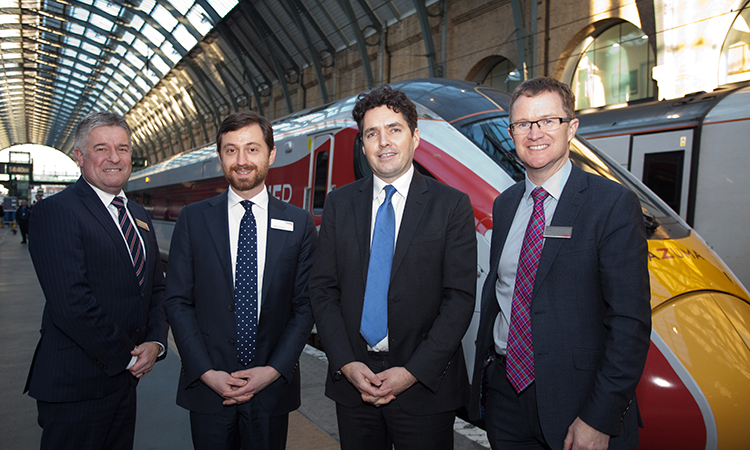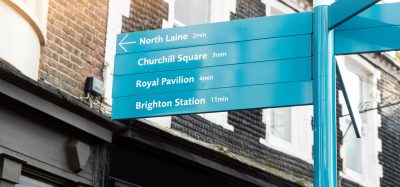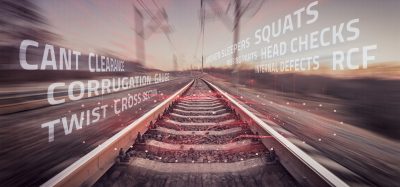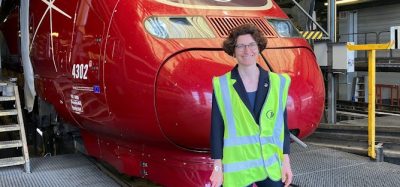Breakthrough year for East Coast Digital Programme celebrated
Posted: 9 December 2022 | Elliot Robinson (Editorial Assistant - Global Railway Review) | No comments yet
With 2022 drawing to a close, the UK Rail Minister has visited Kings Cross to mark a year of delivery for the East Coast Digital Programme.


From left to right: Paul Boyle, LNER; Toufic Machnouk, Network Rail; Huw Merriman, Rail Minister; David Horne, LNER - Credit: Network Rail
East Coast Digital Programme (ECDP) will see traditional lineside signals on the southern part of the East Coast Main Line replaced with state-of-the-art digital signalling, providing continuous, real-time information to the driver’s cab. The technology, using the European Train Control System (ETCS), will mean more reliable and greener services for passengers and freight, creating the next generation railway.
The East Coast Digital Programme in 2022
During 2022 the ECDP has delivered:
- Commissioning of new signalling and the successful testing of trains using digital signalling on the Northern City Line between Finsbury Park and Moorgate. This is paving the way for the first passenger trains to operate with ETCS on that route in the Spring
- Successful testing of the first retrofitted passenger trains using ETCS at the upgraded Rail Innovation and Development Centre (RIDC) testing facility
- The start of major ETCS retrofitting programmes for freight trains and for commuter trains not already fitted
- An extensive range of ‘full cab’ and desk top based driver simulators with ETCS capability, to enable nearly 3,000 train drivers to be trained to drive with digital signalling
- The progression of a world first project to enable ETCS on steam locomotives intended for main line use.
The year also saw Government approval of the Full Business Case for the ECDP. Over £1 billion of further investment was announced to enable the full delivery of digital signalling for the first time to one of GB’s premier intercity rail routes – the East Coast Main Line.
Rail Minister Huw Merriman was hosted at London King’s Cross where he was given a demonstration of digital signalling on a London North Eastern Railway (LNER) driver simulator, met industry leaders delivering the ground breaking programme, and visited the cab of an LNER Azuma train, already pre-fitted with ETCS.
Related news you will enjoy:
Digital signalling – the revolution has started
GTR Class 387 sent for UK’s first major fleet retrofit for ETCS in-cab signalling
“It has truly been a year of breakthrough delivery on our East Coast Digital Programme, from the commissioning of new signalling to the testing of trains,” Huw Merriman, Rail Minister, said. “This programme is a fantastic example of cross-industry working with Network Rail and train operating companies to deliver a safer, faster, and more efficient rail network right along the vital East Coast Main Line”
“We are creating the future railway, and breakthrough delivery is happening at pace across the many partners involved with the Programme,” Toufic Machnouk, Network Rail’s Director, said. “We are pushing the boundaries with our collaboration across the industry and demonstrating what the industry can achieve when working together across the whole system.”
“We are proud to be forefront of the digital transformation of the railway, working with our industry partners to make journeys even greener and more reliable for customers,” David Horne, Managing Director at LNER, said. “This vital investment in digital signalling will enable our Azuma fleet to realise its full potential. LNER Azuma train cabs are already fitted with the latest world-class technology in preparation for the upgrade which will enable us to bring numerous benefits for our customers. It will help transform customer journeys and make rail travel even smoother, more punctual, and more sustainable.”
“By working together with Network Rail, Siemens, and our trade unions, we have gone from a standing start to commissioning the new digital signalling system on the Northern City Line to Moorgate in under two years,” Tom Moran, Managing Director of Thameslink and Great Northern at Govia Thameslink Railway, said. “This is a great start for such a complex project. The future really does look bright for the East Coast.”
“Digital signalling creates opportunities for longer, heavier and faster freight trains to run on a more reliable railway,” Maggie Simpson OBE, Director General of the Rail Freight Group, said. “By providing more attractive services for our customers we can reduce emissions by shifting more freight from road to rail. The freight sector is making great progress in delivering the necessary changes across our businesses.”
Related topics
European Train Control System (ETCS), Funding & Finance, Operational Performance, Signalling, Control & Communications
Related organisations
Govia Thameslink Railway (GTR), Great Northern, London North Eastern Railway (LNER), Network Rail, Rail Freight Group (RFG)
Related regions
Related people
David Horne, Huw Merriman, Maggie Simpson OBE, Tom Moran, Toufic Machnouk








